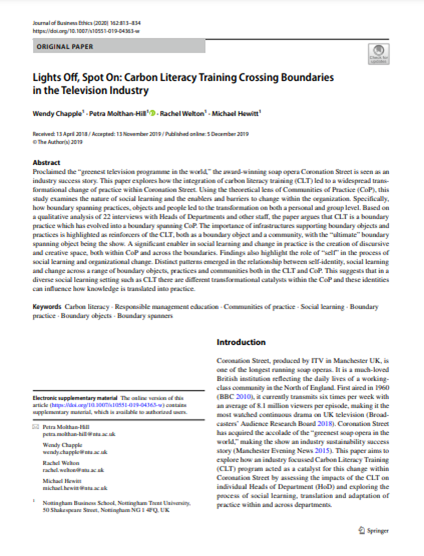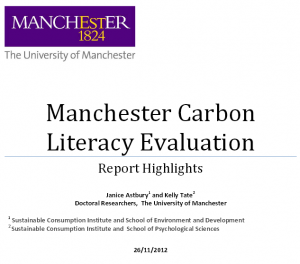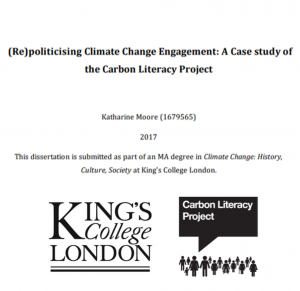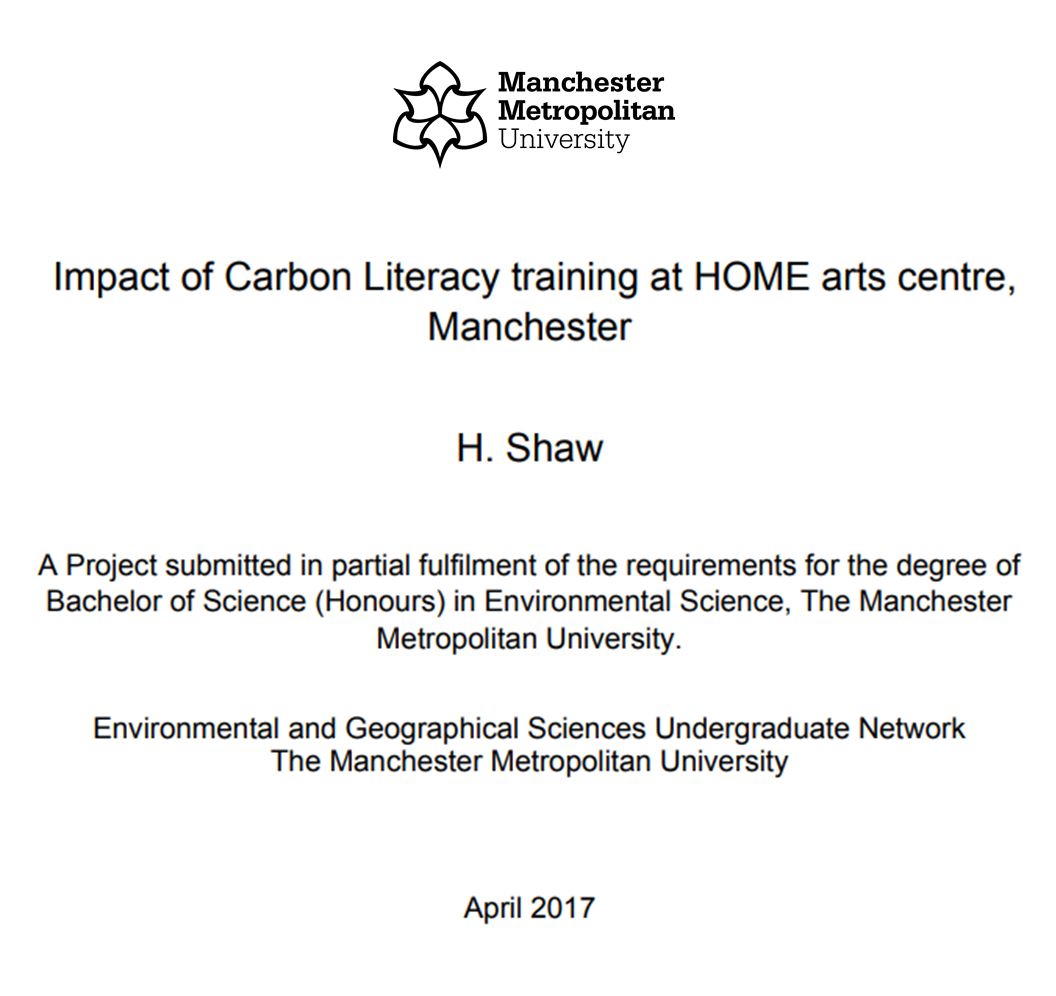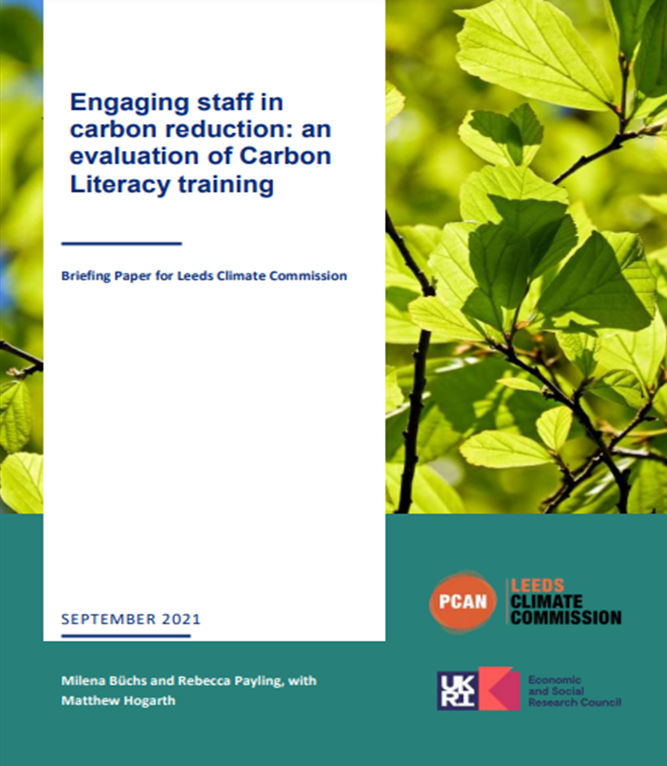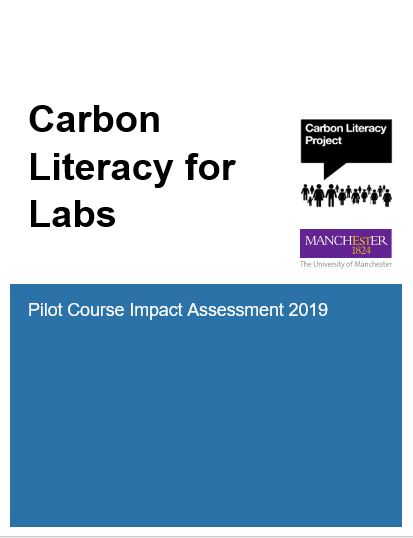Research
Research into Carbon Literacy
The Carbon Literacy Project is a world-first initiative in its aims to empower the citizens of Manchester and beyond with Carbon Literacy.
We are often approached by academic groups who wish to carry out independent research or case studies on The Carbon Literacy Project, a few of which have already been completed (see below).
We also welcome further research to be undertaken and host occasional events for academic researchers to come and have a chat with us. If you feel like you might like to conduct a research project or case study on The Carbon Literacy Project (this could be part of an Undergrad, Masters, PhD, Post Doc course) and want to find out more then we’d love to hear from you. Please get in touch at [email protected] or attend one of our Academic and Researchers events.
We want to share these studies with you, and we welcome your feedback.
Published Research
Lights Off, Spot On: Carbon Literacy Training Crossing Boundaries in the Television Industry
Journal of Business Ethics
December, 2019
Summary: Proclaimed the “greenest television programme in the world,” the award-winning soap opera Coronation Street is seen as an industry success story. This paper explores how the integration of Carbon Literacy training (CLT) led to a widespread transformational change of practice within Coronation Street.
Responsible management involves the embedding of sustainability, responsibility and ethics into the practices of all managers. This study, using the communities of practice and social learning lens, has traced how CLT influenced individual managers and also how the sustainability knowledge and experience gained from the training became translated and embedded into group practice and decisions, resulting in a reduction in greenhouse gas emissions at Coronation Street.
Transformative social learning occurred as a result of the CLT as there was a change in the problematization of everyday events and mental models were reshaped to take into account new information.
Read the article here.
Research Projects
Manchester Carbon Literacy Evaluation: Report Highlights
Doctoral Researchers, The University of Manchester
November, 2012
Summary: This report provides a qualitative evaluation of the experiences of trainers and learners from three project partner organisations, through the completion of a case study involving the Manchester Environmental Education Network (MAES).
“There was clear evidence of specific behaviour change in response to the training. From everyday energy-saving behaviours to household decisions, such as installing cavity wall insulation.”
The study also highlighted several examples of the ‘cascade effect’ – where participants discussed the training or Carbon Literacy with family, friends or colleagues.
Read the report here.
(Re)politicising Climate Change Engagement: A Case study of The Carbon Literacy Project
MSc student, King’s College London
August, 2017
Summary: Findings suggest that the project has both post-political and (re)politicising qualities, which are explained, both separately and together, through different features of the intervention. Most significant and unique being the ability of training to generate consensus and conversation, a context for training that is simultaneously place-specific and set within organisations, as well as attention to the concept of culture.
“… it is about delivering carbon reductions at the same time that it fosters more open discussion about the scope and implication of the changes to be made.”
“The significance of the CLP arguably lies in the actions it inspires in the days, weeks and months after the training.”
Read the report here.
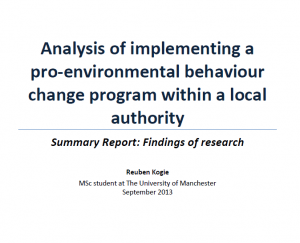
Analysis of implementing a pro-environmental behaviour change program within a local authority
MSc student, The University of Manchester
September, 2013
Summary: This report sought to analyse and evaluate the application of a behavioural change program within a local authority. It took a case study approach centred on Manchester City Council (MCC) as they implemented the Carbon Literacy Standard (CLS).
“…empirical findings suggest overall positive engagement of Carbon Literacy assimilated within Manchester City Council staff. Ties to self-esteem, personal responsibility and commitment to act on environmental concerns have also been discovered where the sample population felt confident in sharing gained knowledge with their peers.”
Full copies of the dissertation can be requested via email: [email protected]
Impact of Carbon Literacy training at HOME arts centre, Manchester
BSc student, Manchester Metropolitan University
April, 2017
This study evaluates Carbon Literacy as a tool to increase engagement with climate change at a workplace level and to inform the development of a carbon management plan.
Summary: The findings show Carbon Literacy is a useful tool to increase an individual’s ability to influence others on climate change and to identify actions in the workplace to reduce carbon. The study is an example of involving employees in the earliest stages of designing a carbon reduction plan and how this leads to positive engagement in the workplace.
Read the report here.
External Impact Reports
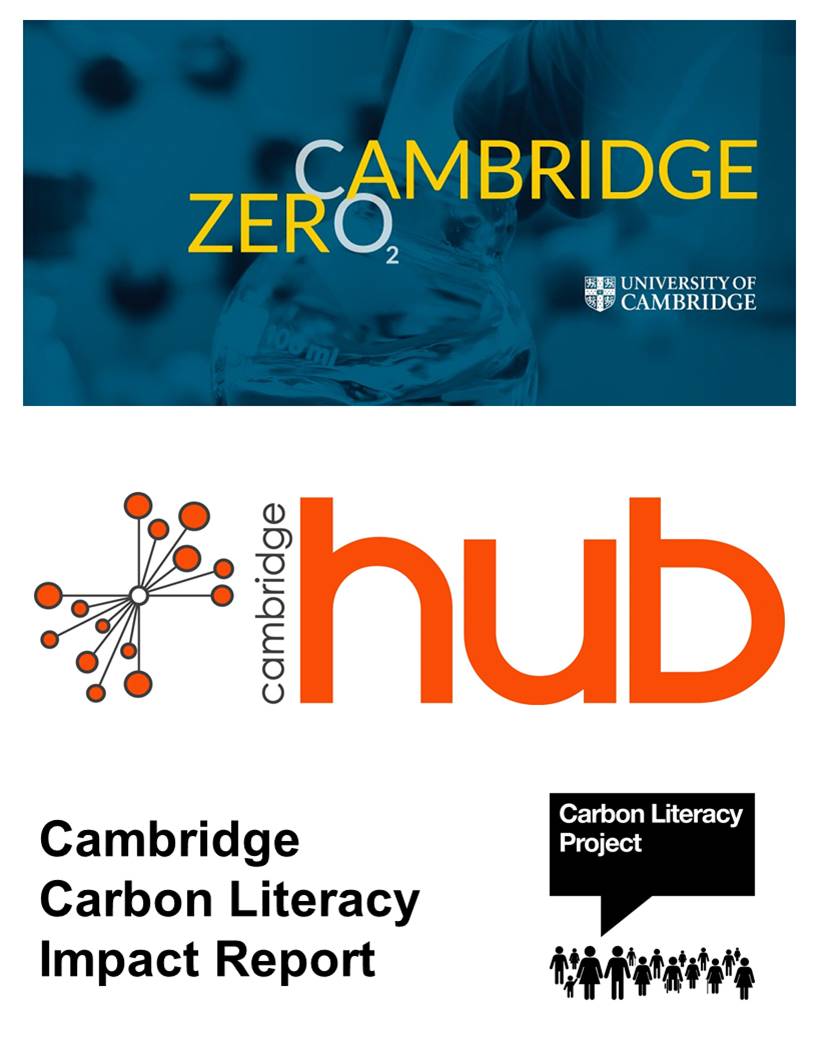
University of Cambridge Carbon Literacy Impact Reports
University of Cambridge
A group of students from the University of Cambridge received training to deliver the Higher Education Carbon Literacy Toolkit to fellow students. These reports show the take-up and outcomes of the ongoing delivery of the toolkit at the university.
Summary: Participants are likely to recommend the course to others at the university and are keen to be kept in the loop, either generally or, about opportunities to get involved in the delivery of the program. Participants were asked to estimate the carbon saving of their individual and group actions pledged. The savings appear very significant. Having seen the breadth and depth of pledges, we feel confident that these calculations are actually significant underestimates.
You can read the individual reports below –
November 2020
February 2021
May 2021
Engaging staff in carbon reduction: an evaluation of Carbon Literacy training
University of Leeds
September, 2021
Summary: This briefing report evaluates the effectiveness of Carbon Literacy (CL) workplace training in encouraging more environmentally-beneficial attitudes and behaviours, and reduction of carbon footprints both at work and at home. The evaluation is based on case studies with Opera North and ITV. We find evidence that Carbon Literacy training can encourage more climate-conscious behaviour.
“Carbon Literacy Training made participants significantly more knowledgeable about climate change and climate action compared to a control group that did not take part in training. The training also encouraged participants to reduce emissions, both at the workplace and at home.”
“Carbon Literacy training works because it creates new work cultures and directly engages staff in making a difference to the organisation. In this way, the intervention can be considered a form of professional development similar to traditional workplace training.”
“Carbon Literacy Training can help to increase general staff motivation and identification with a common cause at the workplace.”
“Carbon Literacy Training is easy to implement from an organisational perspective (provided that financial and time resources for it are available), because it can be tailored to different workplace settings.”
Internal Impact Report
Carbon Literacy for Labs: Pilot Course Impact Assessment
January, 2019
This assessment document reviews the pilot initiative of the world’s first Carbon Literacy for Labs initiative, held at The University of Manchester during October – November 2018.
This is an independent study conducted by The Carbon Literacy Project based on the evidence provided by The University of Manchester. This evidence was collected during the seven Carbon Literacy for Labs day workshops that comprised the pilot.
Read the report here.
Carbon Literacy: Knowledge (CLK) E-learning Effectiveness Report
June, 2017
This report is an analysis of externally collected ‘before and after’ data of over 1000 learners using the Carbon Literacy: Knowledge module, as a method of delivery for the Knowledge section of the Carbon Literacy Standard.
Summary: CLK e-learning is effective in motivating learners to take action on climate change (CC). Following on from the e-learning, participants are most likely to feel – more aware and motivated. Overall, attitudes towards the CLK e-learning were determined to be overwhelmingly positive – “This was a very informative and enjoyable module to follow, and its explanations and science readily understood by someone with little scientific knowledge”.
Read the report here.
Brand Guidelines
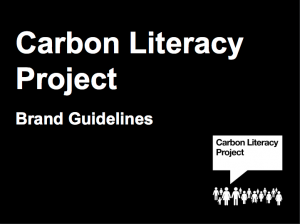
When undertaking research, or writing about The Carbon Literacy Project, please adhere to our Brand Guidelines. The guidelines set out how to correctly use our logos, as well as our associated text and phrasing.
Thank you for your collaboration.
